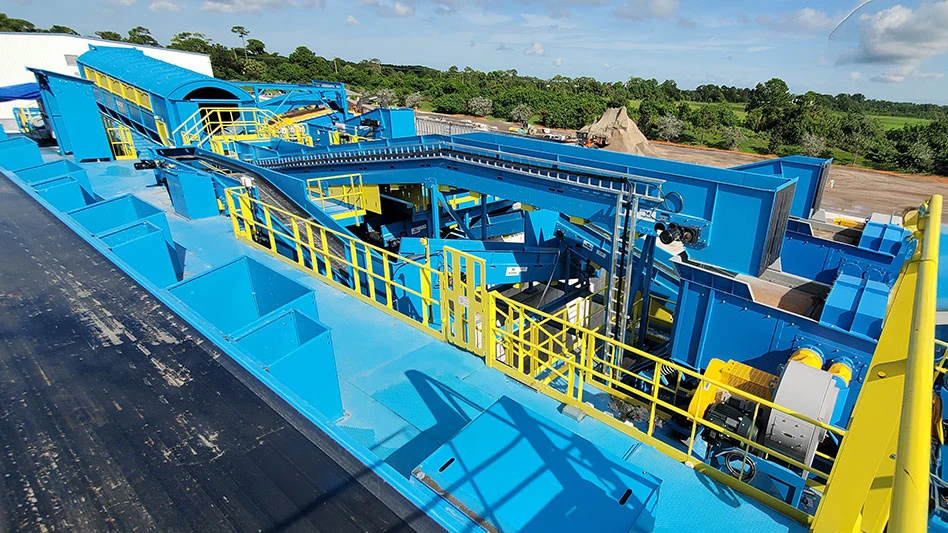Penn State agricultural engineer James W. Garthe has created a process to help farmers deal with the disposal of agricultural and domestic plastics by creating burnable, energy-efficient plastic nuggets.
"In plastics recycling there are two unbreakable rules," Garthe says. "You cannot mix types of plastic and the plastics must be clean. This process [avoids] both since mixed plastics burn just fine and the dirt and debris come out with the coal ash anyway."
Agricultural plastics, such as mulch films, greenhouse films and pots, flats and silage wraps are dirty and the cost of cleaning them before recycling is expensive. Also, these items are made from various plastics, such as low-density polypropylene, high-density polypropylene and polyethylene terephthalate, which cannot be mixed in conventional recycling.
Garthe’s approach is to convert the various plastics into a plastic nugget that can be burned with coal in coal-fired boilers, refuse-derived fuel burners and cement kilns. Because the process does not involve melting, the plastics can be mixed. Only the outer portion of the nugget is fused, forming a melted jacket that contains compressed plastic waste.
Preprocessing for the prototype plant consists of cutting the plastics and hand feeding them into the hopper. A feed rod then pushes the plastics into the die. The die is heated to melt the outer layer, and a snake of compacted, though mostly un-melted plastic emerges. The system will eventually incorporate conveyors, sizing equipment and automatic cutting of the nuggets.
Although Garthe believes emissions are not a problem for the nuggets, Penn State’s Energy Institute is currently testing the nuggets to characterize emissions. A grant from the National Watermelon Promotion Board, U.S. Department of Agriculture, supports the tests.
Garthe has applied for a provisional patent on the process.
| TIRES |
|
GREENMAN PARTNERS WITH U.S. CENTURY GreenMan Technologies Inc., Lynnfield, Mass., has signed an agreement with U.S. Century LLC of San Antonio, Texas, to be the company’s sole producer of roofing shingles from scrap tires. U.S. Century developed the patented "hail proof" product. Shingles are stamped from the tread of scrap passenger and light truck tires, coated and granulated to have a "slate look." FlexShake™ shingles provide the resilience of a tire with more insulation value than traditional asphalt roofing products. U.S. Century will market the shingles to areas of the United States where hail damage to roofs is estimated to cost the insurance industry more than $1.6 billion per year. GreenMan’s newly acquired California operation in Azusa will house the first production line. Bob Davis, GreenMan’s president and chief executive officer says that this agreement furthers GreenMan’s goal of recycling more than 90 percent of each tire. "In the case of FlexShake™, we will not only produce shingles, but value- added playground material and alternative fuel chips from the remainder of the tire," he says. "Our agreement with U.S. Century establishes the first of what we anticipate to be multiple shingle production lines located throughout the country at other GreenMan locations in order to meet the projected demand for FlexShake™. We anticipate each FlexShake™ shingle production line to generate about $1 million per year in revenue," Davis says. David Nowacek, managing partner for U.S. Century, says, "We have been developing and perfecting our patented FlexShake™ shingle product for several years. We have no desire to enter into the scrap tire business, and our research of the industry identified GreenMan as the premier choice." L&S TIRE CO. JOINS KING COUNTY’S LINKUP PROGRAM L & S Tire Company has joined the LinkUp program of King County, Wash. The Link-Up team will assist L & S Tire in researching technology grant opportunities, updating the company’s business plan and providing market research assistance. LinkUp will help L & S Tire evaluate the feasibility of entering two new, higher-value markets: the manufacturing of smaller tire chips for civil engineering applications and tire-derived fuel and the production of crumb rubber for use in recycled rubber products. L & S Tire, headquartered in Spokane with a facility in Lakewood, Wash., collects scrap tires from waste transfer stations, landfills, tire retailers and wrecking yards. Launched in 1999, the company is Washington’s largest scrap tire recycler and one of the largest in the Northwest. Last year, L & S collected 1.5 million scrap tires in Washington, Idaho and parts of Oregon. The King County Solid Waste Division launched LinkUp two years ago to encourage businesses and manufactures to incorporate more recycled materials into their products. For more information on LinkUp, contact Erv Sandlin at (206) 296-0233, or visit http://dnr.metrokc.gov/linkup. |

Explore the December 2002 Issue
Check out more from this issue and find your next story to read.
Latest from Recycling Today
- Greenwave raises revenue but loses money in Q2 2025
- Recycled steel prices hold steady
- EY says India’s need for scrap imports will continue
- Coming full circle
- Amcor, DCM introduce fertilizer packaging with 35 percent recycled content
- Comstock Metals gets closer to commissioning commercial-scale solar panel recycling facility
- Washington selects Circular Action Alliance as PRO
- Smurfit Westrock expands in Latin America





